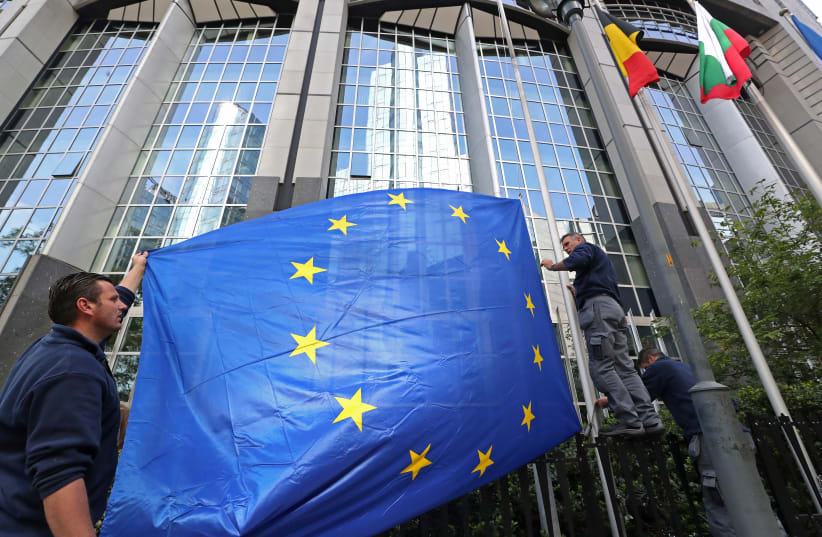Fearing an open conflict between Iran and the United States, EU foreign ministers, joined by NATO Sec.-Gen. Jens Stoltenberg, held a rare emergency meeting to call for calm following the January 3 US drone strike that killed an Iranian general and Wednesday’s retaliatory attacks by Iran.
But unlike the United States, which on Friday imposed new economic sanctions on Iran, the Europeans gave Tehran more time to avoid nuclear proliferation at its doorstep rather than begin a process that could lead to a reimposition of UN sanctions.
“The region cannot afford another war, we call for an urgent de-escalation and maximum restraint,” EU foreign policy chief Josep Borrell told reporters following the meeting.
Borrell said the 28 foreign ministers had agreed to step up their diplomacy to defuse tensions. He gave no specific details beyond reiterating commitment to preserving the nuclear accord and reinforcing support for Iraq.
“We call on Iran to go back to full compliance and we are relying on the IAEA to continue to monitor and verify Iran’s activities,” Borrell said referring to the UN atomic watchdog, the International Atomic Energy Agency, he said.
Diplomats said that in principle, Berlin, London and Paris have agreed to begin a dispute resolution process under the 2015 deal that could lead to renewed UN sanctions on Tehran, but have hesitated on the timing fearing Iran may react badly.
“We were planning to do so, but now it would be seen as an escalatory measure. We still need to focus minds, but it’s probably coming soon,” an EU diplomat said.
Borrell told reporters that the government 21015 deal, known as the Joint Comprehensive Plan of Action was important because without it, “Iran would be a nuclear power.” He added, “thanks to this deal, Iran is not a nuclear power and we strongly believe that it is in our interest to preserve the JCPOA.
Maybe there is no way to avoid the cancellation of the deal, Borrell said, but ““We want to save this deal if its possible, because to negotiate a new agreement is a highly complex technical process that will make a long time.”
Despite its decision on uranium enrichment, Iran has said the United Nations nuclear watchdog, the IAEA, can continue its on-site inspections at its atomic sites, leaving some room for diplomacy.
The meeting, which diplomats said showed EU unity on supporting the Iran deal despite US President Donald Trump’s call this week for Europe to walk away from it, contrasted with EU foreign ministers’ public comments.
Borrell declined to comment on Iran’s resistance to an independent inquiry into the crash of a Ukrainian airliner in Tehran. Canada and others believe the plane was downed by an Iranian missile, probably by mistake.
French Foreign Minister Jean-Yves Le Drian had already warned before Friday’s meeting that Iran could have a nuclear weapon in one to two years if the country fully breaks with a nuclear containment accord it reached with world powers in 2015.
“We want this (nuclear) agreement to have a future, but it only has a future if it is adhered to and we expect this from Iran,” German Foreign Minister Heiko Maas told reporters.
Iran has been gradually discarding the deal’s limitations on its enrichment of uranium for nuclear fuel since Trump withdrew the United States from the accord in 2018, demanding tougher curbs on Iran.
Tehran has said its steps away from the agreement are reversible if Washington lifts sanctions.
Washington imposed more sanctions on Iran on Friday and a senior U.S. official said its policy on Iran is a more effective non-proliferation tool to force Tehran to negotiate a broader deal than the 2015 nuclear deal.
Following the US drone strike that killed Iranian commander Qassem Soleimani, Tehran announced on Sunday it was scrapping all enrichment curbs - leaving the European powers in an awkward position.
Iran has repeatedly denied its nuclear program has military rather than civilian ends. But it has already breached many of the restrictions meant to increase the amount of time Tehran would need to accumulate enough fissile material for an atomic bomb from two to three months to about a year.
Europeans also want to convince Trump that they are tough-minded allies who will not be deceived by Tehran.
They also fear the US-led coalition fighting Islamic State militants in Iraq could be weakened, undermining a core strategic interest for the EU.
Tovah Lazaroff contributed to this report.
